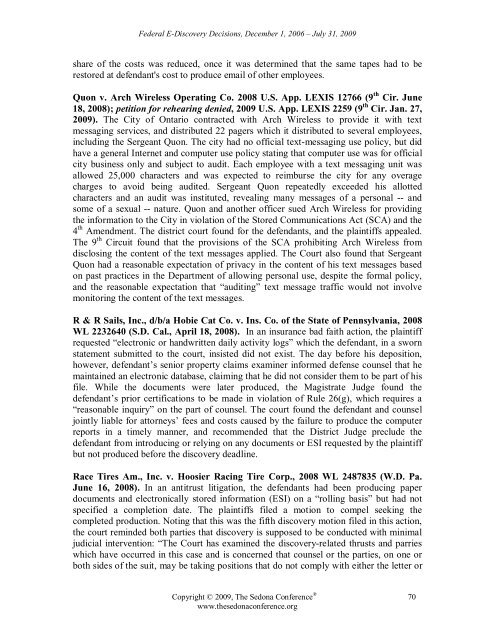Federal Court Decisions Involving Electronic Discovery, December 1 ...
Federal Court Decisions Involving Electronic Discovery, December 1 ...
Federal Court Decisions Involving Electronic Discovery, December 1 ...
You also want an ePaper? Increase the reach of your titles
YUMPU automatically turns print PDFs into web optimized ePapers that Google loves.
<strong>Federal</strong> E-<strong>Discovery</strong> <strong>Decisions</strong>, <strong>December</strong> 1, 2006 – July 31, 2009<br />
share of the costs was reduced, once it was determined that the same tapes had to be<br />
restored at defendant's cost to produce email of other employees.<br />
Quon v. Arch Wireless Operating Co. 2008 U.S. App. LEXIS 12766 (9 th Cir. June<br />
18, 2008); petition for rehearing denied, 2009 U.S. App. LEXIS 2259 (9 th Cir. Jan. 27,<br />
2009). The City of Ontario contracted with Arch Wireless to provide it with text<br />
messaging services, and distributed 22 pagers which it distributed to several employees,<br />
including the Sergeant Quon. The city had no official text-messaging use policy, but did<br />
have a general Internet and computer use policy stating that computer use was for official<br />
city business only and subject to audit. Each employee with a text messaging unit was<br />
allowed 25,000 characters and was expected to reimburse the city for any overage<br />
charges to avoid being audited. Sergeant Quon repeatedly exceeded his allotted<br />
characters and an audit was instituted, revealing many messages of a personal -- and<br />
some of a sexual -- nature. Quon and another officer sued Arch Wireless for providing<br />
the information to the City in violation of the Stored Communications Act (SCA) and the<br />
4 th Amendment. The district court found for the defendants, and the plaintiffs appealed.<br />
The 9 th Circuit found that the provisions of the SCA prohibiting Arch Wireless from<br />
disclosing the content of the text messages applied. The <strong>Court</strong> also found that Sergeant<br />
Quon had a reasonable expectation of privacy in the content of his text messages based<br />
on past practices in the Department of allowing personal use, despite the formal policy,<br />
and the reasonable expectation that “auditing” text message traffic would not involve<br />
monitoring the content of the text messages.<br />
R & R Sails, Inc., d/b/a Hobie Cat Co. v. Ins. Co. of the State of Pennsylvania, 2008<br />
WL 2232640 (S.D. Cal., April 18, 2008). In an insurance bad faith action, the plaintiff<br />
requested “electronic or handwritten daily activity logs” which the defendant, in a sworn<br />
statement submitted to the court, insisted did not exist. The day before his deposition,<br />
however, defendant’s senior property claims examiner informed defense counsel that he<br />
maintained an electronic database, claiming that he did not consider them to be part of his<br />
file. While the documents were later produced, the Magistrate Judge found the<br />
defendant’s prior certifications to be made in violation of Rule 26(g), which requires a<br />
“reasonable inquiry” on the part of counsel. The court found the defendant and counsel<br />
jointly liable for attorneys’ fees and costs caused by the failure to produce the computer<br />
reports in a timely manner, and recommended that the District Judge preclude the<br />
defendant from introducing or relying on any documents or ESI requested by the plaintiff<br />
but not produced before the discovery deadline.<br />
Race Tires Am., Inc. v. Hoosier Racing Tire Corp., 2008 WL 2487835 (W.D. Pa.<br />
June 16, 2008). In an antitrust litigation, the defendants had been producing paper<br />
documents and electronically stored information (ESI) on a “rolling basis” but had not<br />
specified a completion date. The plaintiffs filed a motion to compel seeking the<br />
completed production. Noting that this was the fifth discovery motion filed in this action,<br />
the court reminded both parties that discovery is supposed to be conducted with minimal<br />
judicial intervention: “The <strong>Court</strong> has examined the discovery-related thrusts and parries<br />
which have occurred in this case and is concerned that counsel or the parties, on one or<br />
both sides of the suit, may be taking positions that do not comply with either the letter or<br />
Copyright © 2009, The Sedona Conference ® 70<br />
www.thesedonaconference.org
















